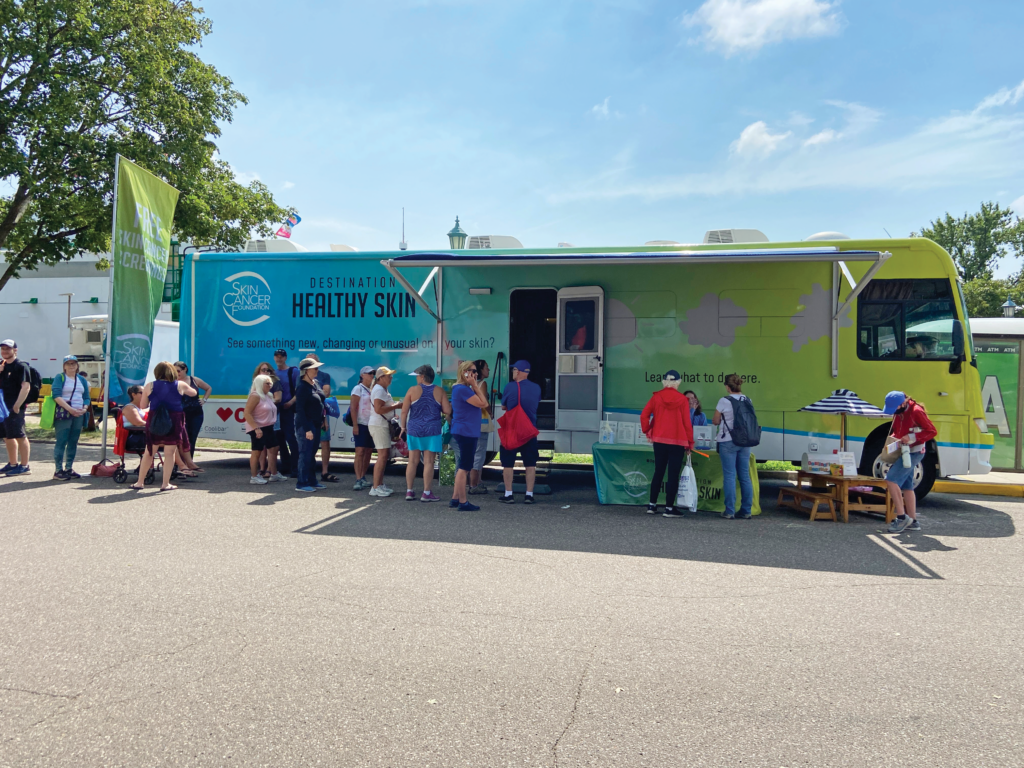Sometimes screenings come to you: Participants lined up for free screenings when the Destination Healthy Skin RV was at the Minnesota State Fair in August 2022.
Q: I’m worried about a spot on my skin, but my insurance won’t pay for an annual screening, and I can’t afford to pay for it myself. Is there a way to get my skin checked without breaking the bank?
Boris D. Lushniak, MD: You’ve run into a regrettable gap in American medical care — one that the White House Cancer Moonshot has pledged to fill. To realize its ambitious goal of reducing cancer deaths in the U.S. by 50 percent over the next 25 years, the Cancer Moonshot has identified expanding access to cancer screening (the key to early detection) as one of the most important steps in that process.
In the case of skin cancer, several factors play into the screening gap you’ve encountered. One is the scarcity of dermatologists with expertise in detecting cancerous or precancerous skin lesions relative to the number of patients in need of such evaluations. It’s a supply-and-demand situation. Then, of course, there’s the obvious issue of compensation. Who’s going to pay for these exams? Insurers, like everyone else in the medical field, are more and more focused on the return on the finite resources they have, and they’re reluctant to pay for services they may believe are not just costly but maybe unnecessary.
This belief, by the way, is not simply a rationalization for denying care; with skin cancer, overtreatment can be a legitimate concern. The literature is mixed on whether early detection is unequivocally beneficial for all skin cancers. In the process of diagnosing skin cancer, there is a point when the physician asks, “Will this carcinoma evolve and result in excess morbidity or even mortality?” If not, do early detection and treatment make sense?
This question arises not just in dermatology but with other types of cancer screenings, too, and often leads to controversy. Not everyone responds as I do, which is to say, “If I have any kind of skin cancer on me, I prefer that it be diagnosed early so that I can decide, with my physician, what I’m going to do about it.” [Editor’s note: The Skin Cancer Foundation has long maintained that regular skin cancer screenings save lives.] To throw one more element into the mix, there’s the undeniable truth that, even though our skin is our largest organ, it has been regarded historically as less important than other organs. Our skin is not usually considered a realm where mortality happens, even though clearly people do die of skin cancer. But the traditional response to skin problems was, “Stop complaining and put a cream on it.” That’s an antiquated way of viewing such an important organ, but those attitudes linger, even today. I see our path forward as one of continuous advocacy — of convincing insurers, health-care providers and the public that the skin and its diseases should be taken just as seriously as those of any other organ. I think we are making progress in reaching that goal.
None of the above solves your dilemma, but I hope it puts it in perspective. Fortunately, there are a couple of strategies that you can pursue. If you don’t have a dermatologist you see regularly, you could start with your primary care physician, especially if you have any spots or lesions on your skin that you are worried about. The Skin Cancer Foundation recommends that you check your skin head-to-toe each month. Trust your instincts; one of the biggest mistakes patients make is keeping silent and waiting for a professional to discover something problematic rather than bringing it up themselves. If your physician decides that you need further evaluation by a specialist, your insurance is more likely to cover that referral. (However, that may be dependent on the specifics of the insurance carrier.) Skin cancer is increasingly common yet fully treatable if detected early — and early detection brings significant cost savings.
The second strategy is one that is becoming more common as public education about skin cancer prevention has increased. During Skin Cancer Awareness Month in May, free skin cancer screenings, whether sponsored by associations of local dermatologists who donate their time, by nonprofit organizations such as The Skin Cancer Foundation, by state agencies or even by federal programs, are available at malls and schools, near beaches, sometimes via mobile medical units that travel through residential neighborhoods. Some of these programs became limited or on hold during the pandemic but are coming back.
These free screenings do not offer a full spectrum of care; they will not biopsy a lesion or provide treatment. But they make it possible for you to get a free, in-depth examination of your skin from a medical professional who will evaluate whether you need additional intervention. Essentially, the evaluation will fall into one of three categories: The health-care provider will see a spot and say, “I’m really worried about that; I’ll refer you to a specialist for a biopsy.” Or they might say, “I see a spot I’m not worried about right now, but I want to keep an eye on it, so get screened again next year.” Or they’ll say, “Your skin looks fine; I don’t see anything that concerns me.” The idea is to get your skin looked at by an expert and, depending on the diagnosis, put you on the pathway to further, fully insured care.
About the Expert:
 Boris D. Lushniak, MD, is dean of the School of Public Health at the University of Maryland in College Park. From 2010 to 2015, Dr. Lushniak was the U.S. deputy surgeon general and served as the acting surgeon general from July 2013 to December 2014. In the latter capacity, he was responsible for releasing the U.S. government’s first ever Call to Action to Prevent Skin Cancer, in 2014.
Boris D. Lushniak, MD, is dean of the School of Public Health at the University of Maryland in College Park. From 2010 to 2015, Dr. Lushniak was the U.S. deputy surgeon general and served as the acting surgeon general from July 2013 to December 2014. In the latter capacity, he was responsible for releasing the U.S. government’s first ever Call to Action to Prevent Skin Cancer, in 2014.




